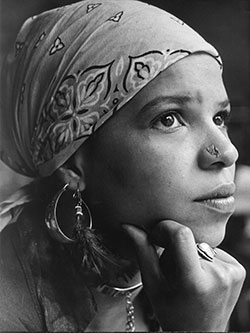Video Courtesy of reelblack
Playwright, poet and author Ntozake Shange, whose most acclaimed theater piece is the 1975 Tony Award-nominated play “For Colored Girls Who Have Considered Suicide/When the Rainbow is Enuf,” died Saturday, according to her daughter. She was 70.
Shange’s “For Colored Girls” describes the racism, sexism, violence and rape experienced by seven black women. It has been influential to generations of progressive thinkers, from #MeToo architect Tarana Burke to Pulitzer Prize-winning playwright Lynn Nottage. After learning of Shange’s death, Nottage called her “our warrior poet/dramatist.”

Poet, playwright and actress Ntozake Shange is shown in New York City in July 1976. (AP Photo)
Savannah Shange, a professor of anthropology at the University of California at Santa Cruz, said Saturday that her mother died in her sleep at an assisted living facility in Bowie, Maryland. She had suffered a series of strokes in 2004.
“She spoke for, and in fact embodied, the ongoing struggle of black women and girls to live with dignity and respect in the context of systemic racism, sexism and oppression,” Savannah Shange said.
“For Colored Girls” is an interwoven series of poetic monologues set to music — Shange coined the form a “choreopoem” for it — by African-American women, each identified only by a color that she wears.
Shange used idiosyncratic punctuation and nonstandard spellings in her work, challenging conventions. One of her characters shouts, “i will raise my voice / & scream & holler / & break things & race the engine / & tell all yr secrets bout yrself to yr face.”

Author Ntozake Shange attends a special screening of ‘For Colored Girls’ at the Ziegfeld Theatre on Monday, Oct. 25, 2010 in New York. (AP Photo/Evan Agostini)
It played some 750 performances on Broadway — only the second play by an African-American woman after “A Raisin in the Sun” — and was turned into a feature film by Tyler Perry starring Thandie Newton, Anika Noni Rose, Kerry Washington and Janet Jackson.
Born Paulette Williams in Trenton, New Jersey, she went on to graduate from Barnard College and got a master’s degree from the University of Southern California. Her father, Dr. Paul T. Williams, was a surgeon. Her mother, Eloise Owens Williams, was a professor of social work. She later assumed a new Zulu name: Ntozake means “She who comes with her own things” and Shange means “She who walks like a lion.”
“For Colored Girls” opened at the Public Theater in downtown Manhattan, with Shange, then 27, performing as one of the women. The New York Times reviewer called it “extraordinary and wonderful” and “a very humbling but inspiring thing for a white man to experience.” It earned Shange an Obie Award and she won a second such award in 1981 for her adaptation of Bertolt Brecht’s “Mother Courage and Her Children” at the Public Theater.
Shange’s other 15 plays include “A Photograph: A Study of Cruelty” (1977), “Boogie Woogie Landscapes” (1977), “Spell No. 7” (1979) and “Black and White Two Dimensional Planes” (1979).
Her list of published works includes 19 poetry collections, six novels, five children’s books and three collections of essays. Some of her novels are “Sassafrass, Cypress, and Indigo” (1982) and “Some Sing, Some Cry,” with her sister, Ifa Bayeza. Her poetry collections include “I Live in Music” (1994) and “The Sweet Breath of Life: A Poetic Narrative of the African-American Family” (2004). She appeared in an episode of “Transparent” and helped narrate the 2002 documentary “Standing in the Shadows of Motown.”
She worked with such black theater companies as the Lorraine Hansberry Theatre in San Francisco; the New Freedom Theater in Philadelphia; Crossroads Theatre Company in New Brunswick, New Jersey; St. Louis Black Rep; Penumbra Theatre in St. Paul, Minnesota; and The Ensemble Theatre in Houston, Texas.
Shange taught at Brown University, Rice University, Villanova University, DePaul University, Prairie View University and Sonoma State University. She also lectured at Yale, Howard, New York University, among others.
In addition to her daughter and sister, Shange is survived by sister Bisa Williams, brother Paul T. Williams, Jr. and a granddaughter, Harriet Shange-Watkins
